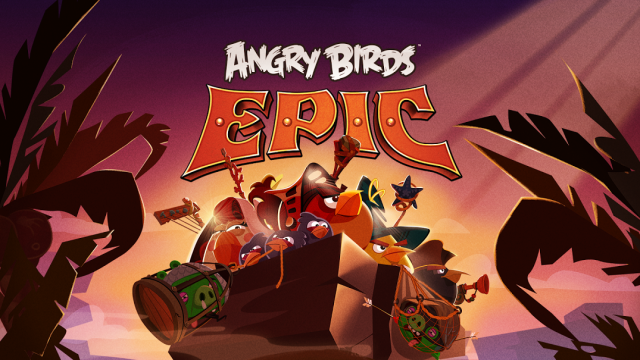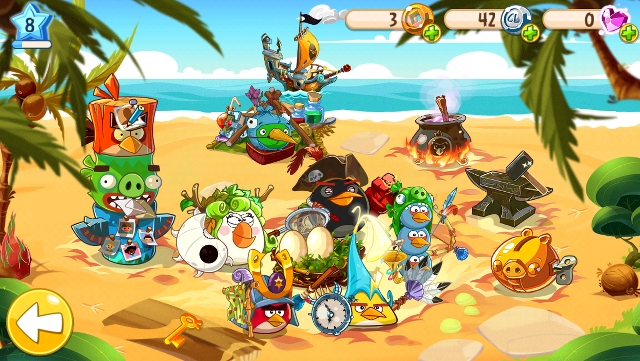
Welcome to Tête-à-tête, a new series where two of our writers remark on interesting topics in the mobile landscape — through chat. This week, Douglas and Daniel talk about Google’s gaming announcements at GDC and why Rovio continues to surpass our avian expectations.
Douglas Soltys: GDC is not replete this year with exciting mobile gaming news, but two items stand out: one I know you’re interested in talking about and one you’re likely loathe to discuss, which makes it all the sweeter. But let’s start with the good stuff.
Google is leveraging a new Unity plug-in to bring cross-platform gaming to iOS and Android. My first thought is that this is a great thing for developers to leverage their gamer base across platforms to generate more money – and perhaps more fun for gamers, as there will be more opportunities to play games with friends regardless of what device they own. My second thought is that this is simply more evidence that Google doesn’t really care what device you own any more, as it is a company committed to making money off of its services and your data.
A question to you: where is Apple in all of this? Obviously building a similar cross-platform is generally beyond Apple’s modus operandi, but do you think they’ll try to respond in any way, possibly by even rejecting apps that use the service? It seems as though Apple can make hardware and nothing else; Google has them completely boxed in.
Daniel Bader: It’s been interesting, as a casual gamer, reading all about the platform enhancements that are turning iOS and Android into gaming’s biggest affront to the traditional buy-and-install model we’ve seen for 25 years on consoles.
I love that Google has made Play Games multiplatform, much like it has done for the rest of its services like Maps, Hangouts and, ahem, Google+. Cross-platform game creation has become easy enough, with tools like Unity, to roll out excellent games to iOS, Android — even Windows Phone and BlackBerry 10 — on the same day, but social tools are not just good for engagement, but revenue. You’re absolutely right that these social tools are all about finding new ways for developers to make money — look at Candy Crush begging on Facebook as the ultimate example of this proliferation — but Google’s announcements this week go far beyond that.
Google would still prefer that you play your games on Android, at least on paper. The company has been steadily adding features to its Play Games SDK that make Android a fantastic gaming opportunity, but iOS is still the primary destination for developers and gamers alike. To miss that opportunity would be self-immolation in the form of pride. Google can’t afford to cede any more ground to Apple in this regard, and giving iOS developers the option to add multiplayer to their cross-platform games, which includes the cloud synchronization of game progress and other local data, incentivizes choosing Play Games over Game Center every time. Think of the games that use Game Center properly — Mr. Crab, Letterpress, among others — they’re all iOS exclusives. Developers would be stupid to continue sioling their cross-platform games with different engagement tools, especially when it means less money in their pockets.
Despite rumours that Apple is building a version of iTunes for Android (it will never happen, IMO), it has never felt comepelled to reach beyond its borders. Game Center is iOS-only because there are hundreds of millions of iOS gamers, and creating friction between its product focus and acquiring more low-quality users (which they would certainly term Android users as) is not even a question. Apple knows that its loyal customers probably own an iPad in addition to an iPhone, and are familiar with the fundamentals held within; staunch rejection of anything outside of its ecosystem. For better or worse, Apple will continue to propagate this message.
Remember, though, there are more than just Apple and Google playing this game. Rovio recently began publishing games outside of its own core Angry Birds franchise, and allows users to synchronize game data over the cloud with its own tools, not Google’s or Apple’s. If a company is big enough, like Rovio, Supercell or King, they need not tether themselves to the proprietary tools of an operating system creator. At the end of the day, content is still key, and if the platforms’ most popular games, from Angry Birds to Clash of Clans to Candy Crush, eschew the engagement tools provided by Apple or Google in favour of their own, it will prevent just one SDK from becoming dominant. And that’s a good thing.
Douglas: Ding ding ding! You just said the magic words which recuse me of guilt for broaching the next subject: Rovio and Angry Birds. Rovio just released a beta version of Angry Birds Epic in Canada (which is extremely smart and something I think more developers should do. “Canada: the World’s Beta Testers!”) and I am not ashamed to admit I can’t put it down. Even in its not-ready-for-Prime-Time state, its a polished and compelling game.
I’m also not ashamed to admit that I’m not 100% clear on why the game exists (rarely do I have shame). It’s ostensibly a streamlined grind RPG that replaces the dungeon crawl with a detailed, Candy Crush Saga-like world map and a battle screen ripped from Final Fantasy. It also has a balanced combat system that requires strategy and effective use of your avian warriors — one cannot simply tap and swipe their way to success. It features a rich crafting system more enjoyable than Skyrim’s. The genre’s text-heavy, plodding story tropes have been replaced with enjoyable, wordless cut-scenes to keep the game moving. Payment based upgrades are available, but not necessary (if you’re willing to grind). Characters can switch battle classes on a whim, fer chrissakes. In many ways, it is the perfect RPG for mobile.
And I don’t know why Rovio made it. You can plop an iPad in front of an 8-year old or an 80-year old and they will enjoy every prior Angry Birds game — that is the brand’s universal appeal. But they will not be able to play Angry Birds Epic. Despite Rovio’s smart design, the core gameplay is simply too complicated for casual gamers. I suppose Rovio could be looking to expand its demographic towards blue chip gamers (i.e. lower returns with long-term security), but I think the Angry Birds casual brand might scare them away. I understand that Clash of Clans is very popular, but its popular for very different reasons — reasons that cause the average consumer to lose years of their lives to The Sims, but scoff at ‘”those Dungeon and Dragons games.”
Obviously Rovio’s massive brand awareness, and those propriety platform tools you mentioned, almost guarantee the game will be at least a moderate success. But I still don’t understand why Rovio would spurn making The Next Angry Birds game in favour of making to make this Angry Birds game.
Daniel: Rovio can do whatever the hell it wants, that’s why it made Angry Birds Epic, and also why it supports multi-platform cloud syncing via Rovio Accounts. It’s not enough for the company to own your eyeballs, it also wants to own your data. Angry Birds is a simplistic game that doesn’t generate a lot of unique play styles, so Rovio hasn’t had a great opportunity to cater the various iterations to a particular player’s style. Sure, Angry Birds Star Wars appeals to a certain nerdy casual gamer, but since 2009 the company has been releasing the same game with different skins, year after year.
Angry Birds Epic is interesting because it allows the company to mine thousands of data points from its myriad player styles, each one representing a potential successful in-app purchase tactic. Do mages tend to purchase more healing spells than warriors their equivalent strength spell (I don’t know, I haven’t played the damn game)? It’s a core marketing due diligence: find what your players are willing to spend, and make it satisfying to do so. In-app purchases haven’t traditionally worked on Angry Birds because players are willing to grind through the tough bits; though you say you haven’t spent a penny, Epic appears to be more suited to its core user base spending lira on lightning or rands on reflection spells.
Coming full circle, that Rovio is about to release Angry Birds Epic means that the free-to-play category, despite push back from a minority of geeks like us, is alive and well. With King about to issue an IPO and even Nintendo rumoured to be entering the mobile space, Rovio continues to prove that by addressing various gaming styles with a set of core brands, recognition will pay off.
Now if Rovio can release the damn game on Android, we can have ourselves a cross-platform leaderboard showdown.
MobileSyrup may earn a commission from purchases made via our links, which helps fund the journalism we provide free on our website. These links do not influence our editorial content. Support us here.



